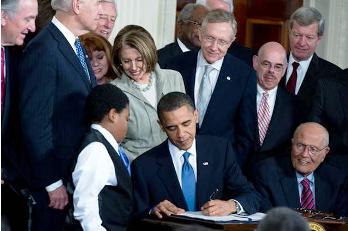Last Friday’s question regarding the 26-state challenge to President Obama’s Affordable Care Act and the three-days of oral arguments in the Supreme Court drew a lot of response.
Before I go any further, let me say that, “no” I have not read all 2,700 pages of the law. I have read through the key features of the law as well as a timeline of implementation. I have also periodically checked a variety of statements by politicians, groups and chain e-mails through two fact checking organizations: politifact.com and factcheck.org.

The political fireworks caused by the law – an earnest effort to change a system long overdue for reform – has, just like the debt debate, turned into an Us v. Them political battlefield where it’s all about winning and least about the people.
So, if ObamaCare goes down to defeat, what then?
From an ethical standpoint, the only way I see to solve this issue is for higher principles to be at work: responsibility, respect and compassion.
I give a great deal of credit to President Obama as the first president to get a comprehensive plan passed in spite of previous attempts that have failed. However, the rhetoric from some opponents has portrayed ObamaCare as a direct attack on liberty. On FOX News, Rick Santorum said, “This bill has far-reaching consequences for the economic health of this country and for basic liberty in our society.”
In all the political back and forth, it’s important to remember that the goal (and name) of the law is The Patient Protection and Affordable Care Act. For me, however, the plan has serious questions most notably, the individual mandate requiring every citizen to pay into a system that is, in effect, overseen by the federal government, something that I am not thrilled by. The government has problems effectively running Medicare – a form of nationalized health care – how are they going to manage a much larger entity?
However, 32 countries offer some form of universal health care, and somehow they have made it work – some better than others. Currently, Massachusetts is the only state to adopt a form of universal coverage. (Read the facts regarding RomneyCare found at FactCheck.org.) To get the other 49 states to adopt a similar plan does not seem likely anytime in our future.
No matter what the Supreme Court decides, Congress and the president are responsible for legislation. Congressional leadership and the president need to sit and listen to what the experts recommend as a comprehensive, cost-effective way to change the current system. That plan should include compassionate provisions for the poor and needy, regardless of pre-existing conditions.
Next, that same leadership needs to privately work together with the experts in developing a stronger plan that would be responsive to the needs of the many in as fair and equitable way possible, and here’s the hard part – they need to do it absentany political agenda.
Congress and the president are legally and morally obligated to act in the best interests of the country – not their party, political action committees or lobbyists. If any member of the Senate or House cannot honestly set aside political agendas and work toward the goal of universal healthcare, then they should step aside for someone who can.
Real leadership means working for the long term interests of all Americans. While respecting the rights of all is important, leadership must also acknowledge a responsibility to everyone even if it means making unpopular decisions.
I’m a great believer in working through issues using the facts. One reader to Friday’s commentary asked, “but do people listen to the facts??” And I wonder about that.
However, while everyone talks about the politics of the issue, there is a harsher reality: the current healthcare system cannot continue as is. If it does, the only people who will benefit will be the rich – the only people who will be able to afford the skyrocketing prices.
The fact is healthcare is not an Us v. Them issue. It’s an issue that will, at some point, affect all of us. And it’s only going to grow more serious as more Americans get older and face more health issues. Anyone who believes otherwise is simply living in denial. Unfortunately, denial doesn’t fix the problem. That’s why elected leaders need a much greater focus on higher principles. Respectful, compassionate, rational and responsible decision-making is the only way we can work through the issue, but only if those who govern recognize and earnestly work with those principles in mind.
Comments









